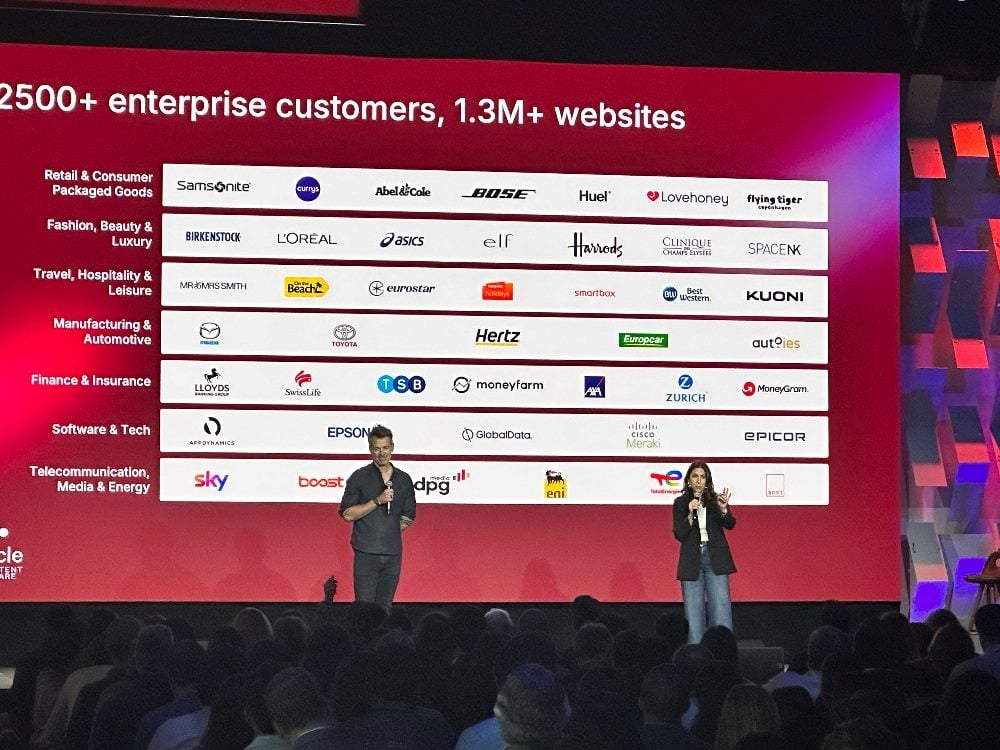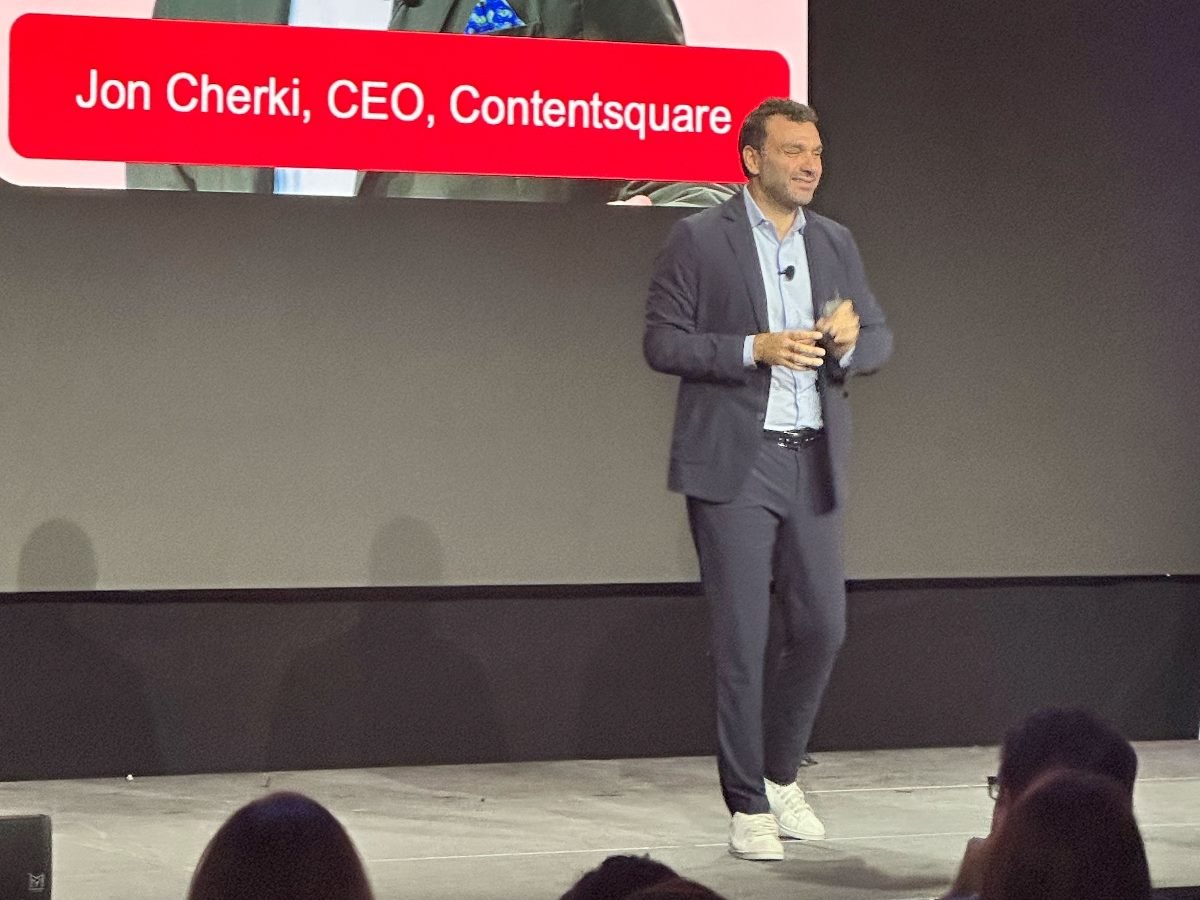The Gist
- AI as a means, not the end. Contentsquare leaders stress AI’s real role is enabling better digital experiences, not just showcasing tech.
- From agents to analysts to automation. The company outlined a three-step AI evolution: proactive agents, data-savvy analysts, and multi-agent automation through MCP.
- Breaking silos with MCP. By connecting AI tools like Claude, Jira, and Optimizely, multi-agent systems promise smoother cross-platform workflows and faster customer impact.
- Elevating marketers’ roles. AI aims to offload data crunching so marketers can focus on strategy, customer journeys, and revenue growth.
- Next frontier is measurement. True omnichannel personalization hinges not just on scale, but on meaningful measurement, testing, and optimization.
NEW YORK CITY — There was no shortage of AI-related announcements at Contentsquare’s 2025 CX Circle event, held at The Glass House in New York City on Sept. 30. But context-setting helped set the stage for why it is so important.
“AI is just a means to an end, with the end being better digital experiences,” said Contentsquare SVP of Product Dave Anderson.
Why AI Needs Context In CX
Complete with several product announcements, customer stories and opportunities to get hands-on with some of the tech, CX Circle took a deep look at how the compounding complexities of measuring cross-channel, hyper-personalized experiences need better tools to measure and understand.
“Customers expect less friction, more flow,” says Jonathan Cherki, CEO and founder of Contentsquare. Yet, he continued, the scale of data needed to measure, and the effort required to make sense of it all “is no longer human-sized.” Thus, it is difficult to understand where to start with all the potential data points.
The approach here takes a three-step approach of increasing complexity and autonomy: agent, analyst and ultimately to broader automation.
Let’s explore each.
Table of Contents
- Agents That Go Beyond a Simple Prompt
- Analysts That Put the 'AI' in Team
- Multi-Agent Automation for a Multi-AI World
- What it Means For Marketers and Customers
Agents That Go Beyond a Simple Prompt
AI adoption is quickly evolving from reactive, prompt-based tools to proactive support and guidance. Contentsquare talked through its recent evolution from AI assistant (with their Sense chat feature, which according to Contentsquare has answered over 150,000 queries since May 2025), to agents, and ultimately to AI automation.
Agents Move Beyond Prompt-Based AI
For example, with a mobile app, there are many steps from installing tags, to dealing with PII, to setting up mapping and zones, all before even getting to the point: testing. Then you still need to train, compare and perform many other steps which automation is able to assist with. Having an AI agent that can perform these types of tasks means marketers can turn their attention to more strategic efforts and connecting dots between initiatives rather than trying to crunch the numbers the best they can.
This helps improve the customer experience through the depth of solutions it can provide, and it improves the employee experience by elevating the role of the marketers and analysts to take outcomes further and push analysis to the limits of the AI’s ability to crunch large volumes of data, hundreds of session recordings and more.
Related Article: Anticipation Is the Real Power of Agentic AI in Customer Experience
Analysts That Put the 'AI' in Team
The announcement of Sense Analyst takes the concept of the agent several steps further, and its training on over a decade of data means it brings a wealth of experience to the table. With very little prompting and context, a marketing can ask Sense Analyst anything from broad to specific questions. This means it can assist marketers by reasoning through the types of analysis that it should do to answer a complex question, and by executing multiple analyses in parallel, all autonomously.
Analysts That Deliver Strategic Insights
With those analyses in tow, Analyst can synthesize findings from across your experience landscape: channels, journey stages, pages and even down to individual pieces of content on a web page. Then, it is able to make specific recommendations based on that synthesis.
Cherki likens it to “opening your laptop every morning to find a team of the best experts in the world has already reviewed your business data and left you a clear, prioritized list” of the important aspects of your customer experience and what to do to make meaningful changes to grow revenue.
Not only does this have the potential to make marketers’ lives easier, those deep and broad recommendations have the potential to impact the customer experience in a more holistic manner than siloed or one-off recommendations can.

Multi-Agent Automation for a Multi-AI World
If a single agent is beneficial, what about two, three or more? Here is where things start to get even more interesting.
Build as in active development, Contentsquare’s approach to Model Context Protocol (MCP) adoption holds much promise. This starts with the user experience of the marketer (or marketing team) tasked with jumping from tool to tool to get their work done. As AI-enabled as any of those individual tools may be, moving from Claude or ChatGPT, to Contentsquare, to Jira, to Optimizely, and potentially others, introduces siloes and disconnects that have the potential to be unified.
Through MCP, an agent in Contentsquare can be tied to other MCP-supported tools, providing agent-to-agent communication and coordination and new possibilities to identify and solve complex issues.
Related Article: Model Context Protocol (MCP): Boosting AI in Marketing Workflows
Connecting The Dots Across Platforms
This means, within an interface like Claude, someone can ask a question, such as “What is our current frustration score?” which taps into Contentsquare’s analytics. Then, through the same interface they can ask Jira, “Is anyone on our team currently working on this?” and when the work is completed, they can ask a tool like Optimizely what the impact was on the work performed. All of this, within their existing interface of choice.
For marketing teams, this has the potential to actually break down those silos so often spoken about, and for customers this means quicker end-to-end planning, implementation and measurement across teams, platforms, channels, and the customer journey.
What it Means For Marketers and Customers
As a CX and marketing profession, we’ve been talking about making omnichannel, 1:1 personalization a reality for a while, but then quickly ran into data and scaling issues when trying to implement it properly. As many brands get closer to realizing it, however, there are still hurdles to overcome.
Even after enabling personalization to occur, how can marketers meaningfully measure, test and optimize nearly endless possibilities? Measurement that results in focus and meaningful improvement is the next frontier.
Here in New York City at CX Circle, Contentsquare was able to share a realistic vision of a future where AI-enabled tools allow brands to understand their customers and their digital experiences better, more holistically and elevate the roles of the marketers themselves. There are still dots to connect, mountains of data to store, sessions to analyze and technologies like MCP to mature.
But the steps to get there, and to make sense of it all, and the potential value of optimization are clearer now.
Learn how you can join our contributor community.
